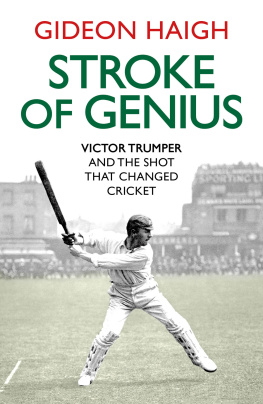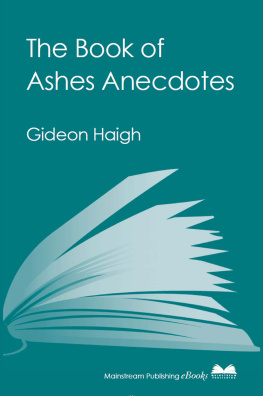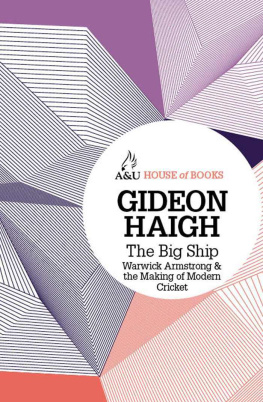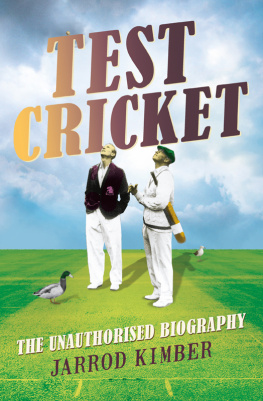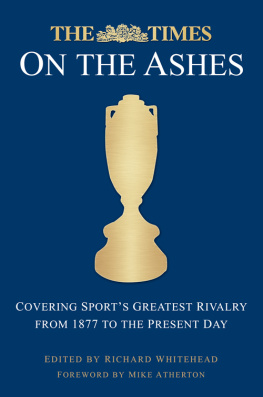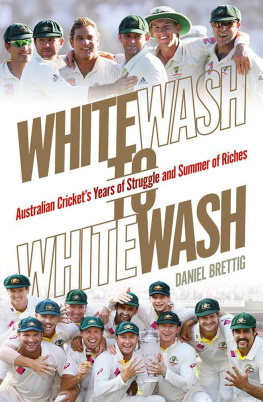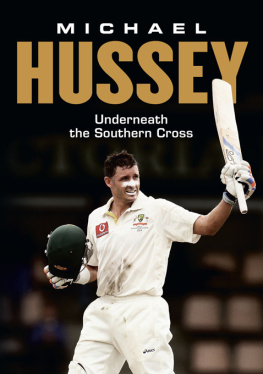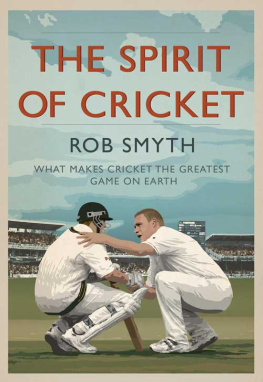ALSO FROM PENGUIN BOOKS
ON WARNE
Gideon Haigh
Now that the Australian cricketer who dominated airwaves and headlines for twenty years has turned full-time celebrity and media event, Shane Warnes sporting conquests and controversies are receding steadily into the past.
But what was it like to watch Warne at his long peak, the man of a thousand international wickets, the incarnation of Australian audacity and cheek? Our leading cricket writer, Gideon Haigh, lived and loved the Warne era, when the impossible was everyday, and the sensational every other day.
In On Warne, he relives the eras highs, its lows, its fun and its follies. Drawing on interviews conducted with Warne over the course of a decade, and two decades of watching him play, Haigh assesses this greatest of sportsmen as cricketer, character, comrade, newsmaker and national figure a natural in an increasingly regimented time, a simplifier in a growingly complicated world. The result is one of the finest cricket books ever written, a whole new way of looking at its subject, at sport, and at Australia.
One day, you might be asked what cricket in the time of Warne was like. On Warne is the definitive account.
Australias best cricket writer, Gideon Haigh, on one of the games greatest players. Stephen Romei, Weekend Australian
Bloody brilliant... As good as anything I have read on the game. Andy Bull, The Guardian (UK)
You get the feeling that Haigh understands Warnes mastery better than Warne himself. Waleed Aly, The Monthly
A masterful book... ceaselessly insightful... Perhaps it is a cliche to refer to a biography as definitive; in this case it would be remiss not to do so. Rob Smyth, The Cricketer (UK)
Kerry Packer
1977 AND ALL THAT
In 2005, Matthew Hayden mentioned to the broadcaster Alan Jones that he had long nursed a desire to meet Kerry Packer, then in poor health, and destined not to last the year. It turned into a dinner chez Packer attended also by Justin Langer, Steve Waugh, Shane Watson and Brett Lee. It was around the time that the doughty Langer had developed an unfortunate propensity for ducking into bouncers; Packer admonished him that he could not be watching the ball. Later in the evening, Packer began to dilate on a favourite subject: luck. Packer family lore is that Kerrys grandfather derived his first capital from spotting a ten-bob note on the ground and placing a successful bet at a Tasmanian racetrack. Warming to his theme, he turned to Langer again: And son, he said, youd know all about luck. If Tony Greig hadnt developed helmets, youd be fuckin dead.
Everyone laughed, and everyone implicitly acknowledged the subtext. For, as any fule kno, Tony Greig developed those helmets while in Kerry Packers employ, as captain of the World XI, one of the three teams that composed his World Series Cricket. Packer might have gone further in a list of the things his cricketers were lucky to enjoy as a result of WSC: the chance to play cricket as a full-time professional, the opportunity to participate in day/night cricket in coloured clothing with white balls and field restriction circles, the whole lavish corporatised television spectacular that modern cricket had become. Aye, it was Kerry Packers world: Langer and his teammates just lived in it. But nobody really needed to mention this, because it was somehow understood, something the cricketers acknowledged by their act of homage to this maker of the modern game.
Seven years on and the nation has now paid collective homage, by watching in the millions the two-part Howzat: Kerry Packers War, on his former network, Channel Nine. Many who watched would not have been born at the time the events dramatised took place, being introduced to the facts by the legend, as it were. If you were watching very closely as the credits rolled, youll have seen my name with the fancy title script supervisor. This is a bit of a misnomer. I didnt supervise anything, let alone the script, which I did not read; nor did I see the series in advance, otherwise I might have persuaded Rick McCosker to shave off his moustache and Clive Lloyd to bat the right way round. Instead, the producers, Southern Star, paid me a modest emolument so that the scriptwriter Chris Lee could consult my book The Cricket War and my memory as he wrote his screenplay which he did, in quite granular detail, both for what went to air, and also for a book-length exposition with the same title as the series.
Howzat was not, I might say, an adaptation of The Cricket War. Perhaps the crispest distinction is that the subject of my book is cricket, while the subject of Chriss screenplay is Kerry Packer. Naturally I dealt with Packer and Chris with cricket, but The Cricket War sees events from a cricketers perspective, while Howzat aims to bring a rumbustious Australian character to life and thanks to Lachy Humes scenery chewing portrayal, I think it succeeds, and memorably so. Both our narratives were seasoned by subsequent events, mine by the fact that Packer became the most powerful figure in Australian cricket, Chriss by the fact that Packer subsequently became Australias wealthiest man. But the process has made me more than usually aware of the trade-offs involved in the accretion of historical information, the process of historical analysis and the dissemination of historical narratives. Kerry Packers World Series Cricket has become a perdurable mythology served by both its participants and its interpreters, each informing the other, each adding complementary, competing, overlapping ideas. Its not a stationary object at which were taking ever more accurate aim; its a firing range of moving sharpshooters aiming at constantly shape-shifting targets. I want to talk tonight about the origins of that mythology, and what Howzat might tell us of its evolution.
Anyway, its getting blurry round the edges of the screen. Yes, were slipping back in time. Can you hear the strains of Countdown? 1977: Elvis Presley either dies or embarks on a career in hospitality; many people hate Malcolm Fraser wholl later like him, and vice versa. Mankind is so primitive, to invoke Douglas Adams, that it still thinks digital watches are a good idea. So how did the cricket world look, apart from the fact that the players wore safari suits and the groupies looked like Delvene Delaney?
Test cricket, 100 years old, was stable, secure, comfortably but not hugely profitable. It had originated in Australia in 1877, under a colonial governance structure that was highly decentralised: a swirl of clubs, associations, ground authorities and, above all, commercially minded players, who formed themselves into the original teams that toured England with legend-building success.
Federation of Australia in 1901 had then had a correspondingly centralising influence, causing the state associations to band together in the foundation of the Australian Cricket Board, which gradually wrested administrative and financial power from the players, assumed responsibility for the organising of Test matches, and distributed the profits amongst the membership, where they were directed to the upkeep of the game.
Two things are worth noting about the Australian Cricket Board in 1977, and they are in tension. It remained a federation, a non-profit entity distributing all the revenues it earned. It had neither reserves, nor premises, nor employees. Australias only paid full-time cricket administrators were the secretaries at each association, one of whom, Alan Barnes of New South Wales, acted additionally in the role for the board, based in an office in Sydney where he kept the files on the floor and his scotch and cigarettes in the filing cabinets. To be fair, Barnes was formidably organised. He was known as Justa, for the fact that in response to every enquiry he would scuttle round the floor of his office saying: Just a minute. Just a minute. It was




